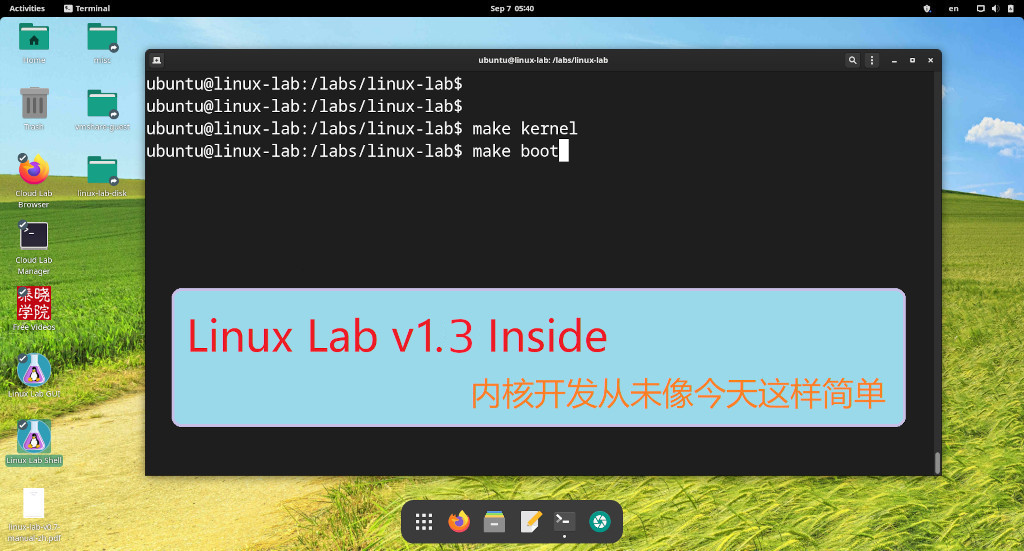[置顶] 泰晓 RISC-V 实验箱,配套 30+ 讲嵌入式 Linux 系统开发公开课
Linux 汇编语言快速上手:4大架构一块学
By Falcon of TinyLab.org 2015/05/13
前言
万事开头难。如果初次接触,可能会觉得汇编语言很难下手。但现如今,学习汇编语言非常方便,本文就此展开。
实验环境
早期学习汇编语言困难,有很大一个原因是没有合适的实验环境:
- 没有钱买开发板
- 找不到合适的开发板
- 有了开发板跑起来也没那么容易
现在学汇编语言根本不需要开发板,可以用 qemu-user-static 直接运行各种架构的汇编语言。
以 Ubuntu 为例,Windows 和 Mac 下的用户可以先安装 VirtualBox + Ubuntu,再安装这个。
sudo apt-get install qemu-user-static
接着安装 gcc。
sudo apt-get install gcc
sudo apt-get install gcc-arm-linux-gnueabi gcc-aarch64-linux-gnu
sudo apt-get install gcc-powerpc-linux-gnu gcc-powerpc64le-linux-gnu
因为 Ubuntu 自带的交叉编译工具不支持 Mips 平台,所以需要额外安装。但是 emdebian.org 从 2014 年以后不再维护,已经无法直接安装。
如果要完整地做完后续实验,强烈推荐使用泰晓科技的 Linux Lab 实验环境,该环境自带了本文所需的交叉编译工具。下面的所有例子都上传到了该环境的 examples/assembly/ 目录下。
Hello World
同大多数资料一样,我们也从 Hello World 入手。
学习一个东西比较高效的方式是照猫画虎,咱们先直接从 C 语言生成一个汇编语言程序。
C 语言版本
先写一个 C 语言的 hello.c:
#include <stdio.h>
int main(int argc, char *argv[])
{
printf("Hello World\n");
return 0;
}
汇编语言版本
生成汇编语言:
gcc -S hello.c
默认会生成 hello.s,可以用 -o hello-x86_64.s 指定输出文件名称。
gcc -S hello.c -o hello-x86_64.s
下面类似地,列出所有 4 个平台 32位 和 64位 汇编语言生成办法。
X86
gcc -m32 -S hello.c -o hello-x86.s gcc -S hello.c -o hello-x86_64.sMIPS
mipsel-linux-gnu-gcc -S hello.c hello-mips.s mipsel-linux-gnu-gcc -mabi=64 -S hello.c -o hello-mips64.sARM
arm-linux-gnueabi-gcc -S hello.c -o hello-arm.s aarch64-linux-gnu-gcc -S hello.c -o hello-arm64.sPowerPC
powerpc-linux-gnu-gcc -S hello.c -o hello-powerpc.s powerpc64le-linux-gnu-gcc -S hello.c -o hello-powerpc64.s
我们就这样轻松地获得了所有平台的第一个可以打印 Hello World 的汇编语言程序:hello-xx.s。
大家可以用 vim 等编辑工具打开这些文件试读,读不懂也没关系,我们下一节会结合后续的参考资料做进一步分析。
编译汇编语言程序
在进一步分析前,我们演示如何把汇编语言编译成可执行文件。
静态编译
如果要直接在当前系统中运行,简便起见,需要把各类库静态编译进去(X86实际不需要,因为主机本身就是X86平台),可以这么做:
X86
gcc -m32 -o hello-x86 hello-x86.s -static gcc -o hello-x86_64 hello-x86_64.s -staticMIPS
mipsel-linux-gnu-gcc -o hello-mips hello-mips.s -static mipsel-linux-gnu-gcc -mabi=64 -Wl,-melf64ltsmip -o hello-mips64 hello-mips64.s -static # Not work ?ARM
arm-linux-gnueabi-gcc -o hello-arm hello-arm.s -static aarch64-linux-gnu-gcc -o hello-arm64 hello-arm64.s -staticPowerPC
powerpc-linux-gnu-gcc -o hello-powerpc hello-powerpc.s -static powerpc64le-linux-gnu-gcc -o hello-powerpc64 hello-powerpc64.s -static # Not work ?
动态编译
静态编译的缺点是把所有用到的库都默认编译进了可执行文件,会导致编译出来的可执行文件占用较多磁盘,而且在运行时占用更多内存。
所以可以考虑用动态编译。动态编译与静态编译的区别是,动态编译需要有动态库装载和链接器:ld.so 或者 ld-linux.so,这个工具的路径默认在 /lib 下。例如:
$ ldd hello-x86
linux-gate.so.1 => (0xf76ea000)
libc.so.6 => /lib/i386-linux-gnu/libc.so.6 (0xf7508000)
/lib/ld-linux.so.2 (0xf76eb000)
$ mipsel-linux-gnu-readelf -l hello-mips | grep interpreter
[Requesting program interpreter: /lib/ld.so.1]
所以,除了 x86 以外,对于相关库都安装在非标准路径下,所以动态编译或者运行时,其他架构需要明确指定库的路径。先通过如下命令获取 ld.so 的安装路径:
$ dpkg -L libc6-mipsel-cross | grep ld.so
/usr/mipsel-linux-gnu/lib/ld.so.1
发现所有库都安装在 /usr/ARCH-linux-gnu[eabixx]/lib/ 下面,所以,可以这么执行:
$ LD_LIBRARY_PATH=/usr/mipsel-linux-gnu/lib/
$ qemu-mipsel $LD_LIBRARY_PATH/ld.so.1 --library-path $LD_LIBRARY_PATH ./hello-mips
或者
$ qemu-mipsel -E LD_LIBRARY_PATH=$LD_LIBRARY_PATH $LD_LIBRARY_PATH/ld.so.1 ./hello-mips
通过上面的方法在 x86 下执行其他架构的程序确实不方便,不过比买开发板划算多了吧。何况咱们还可以写个脚本来替代上面的一长串的命令。
实际上咱们可以更简化一些,可以在编译时指定 ld.so 的全路径:
$ mipsel-linux-gnueabi-gcc -Wl,--dynamic-linker=/usr/mipsel-linux-gnueabi/lib/ld.so.1 -o hello hello.c
$ readelf -l hello | grep interpreter
[Requesting program interpreter: /usr/arm-linux-gnueabi/lib/ld-linux.so.3]
$ qemu-mipsel -E LD_LIBRARY_PATH=$LD_LIBRARY_PATH ./hello-mips
不过这种方法也不是那么靠谱。
可选的办法是,用 debootstrap 安装一个完整的支持其他架构的文件系统,然后把 /usr/bin/qemu-XXX-static 拷贝到目标文件系统的 /usr/bin 下,然后 chroot 过去使用。这里不做进一步介绍了。
汇编语言分析
上面介绍了如何快速获得一个可以打印 Hello World 的汇编语言程序。不过咋一看,简直是天书。
作为快速上手,咱们也没有过多篇幅来介绍太多的背景,因为涉及的背景实在太多。会涉及到:
- ELF 可执行文件格式以及各类 Sections
- 函数调用约定 ABI,包括参数传递,栈操作,返回地址处理等
- 各种 gas 伪指令
- 库函数的动态链接
这些内容是不可能在几百文字里头描述清楚的,所以干脆跳过交给同学们自己参考后续资料后再回过头来阅读。咱们进入下一节,看看更简单的实现。
进阶学习
如果是简单打印 Hello World,咱们其实可以不用调用库函数,可以直接调用系统调用 sys_write。sys_write 是一个标准的 Posix 系统调用,各平台都支持。参数完全一致,不过各平台的系统调用号可能有差异:
ssize_t write(int fd, const void *buf, size_t count);
系统调用号基本都定义在:arch/ARCH/include/asm/unistd.h。例如:
$ grep __NR_write -ur arch/mips/include/asm/
arch/mips/include/asm/unistd.h:#define __NR_write (__NR_Linux + 4)
而 __NR_Linux 为 4000:
$ grep __NR_Linux -ur arch/mips/include/asm/ -m 1
arch/mips/include/asm/unistd.h:#define __NR_Linux 4000
所以,在 MIPS 上,系统调用号为 4004,具体看后面的例子。
下面来看看简化后的例子,例子全部摘自后文的参考资料。
X86
X86 32Bit
.data # section declaration
msg:
.string "Hello, world!\n"
len = . - msg # length of our dear string
.text # section declaration
# we must export the entry point to the ELF linker or
.global _start # loader. They conventionally recognize _start as their
# entry point. Use ld -e foo to override the default.
_start:
# write our string to stdout
movl $len,%edx # third argument: message length
movl $msg,%ecx # second argument: pointer to message to write
movl $1,%ebx # first argument: file handle (stdout)
movl $4,%eax # system call number (sys_write)
int $0x80 # call kernel
# and exit
movl $0,%ebx # first argument: exit code
movl $1,%eax # system call number (sys_exit)
int $0x80 # call kernel
编译和链接:
$ as --32 -o x86-hello.o x86-hello.s
$ ld -melf_i386 -o x86-hello x86-hello.o
X86 64Bit
.global _start
.text
_start:
# write(1, message, 13)
mov $1, %rax # system call 1 is write
mov $1, %rdi # file handle 1 is stdout
mov $msg, %rsi # address of string to output
mov $len, %rdx # number of bytes
syscall # invoke operating system to do the write
# exit(0)
mov $60, %rax # system call 60 is exit
xor %rdi, %rdi # we want return code 0
syscall # invoke operating system to exit
.data
msg:
.ascii "Hello, world\n"
len = . - msg # length of our dear string
编译和链接:
$ as -o x64-hello.o x64-hello.s
$ ld -o x64-hello x64-hello.o
MIPS
mipsel 32Bit
# File: hello.s -- "hello, world!" in MIPS Assembly Programming
# by falcon <wuzhangjin@gmail.com>, 2008/05/21
# refer to:
# [*] http://www.tldp.org/HOWTO/Assembly-HOWTO/mips.html
# [*] MIPS Assembly Language Programmer’s Guide
# [*] See MIPS Run Linux(second version)
# compile:
# $ as -o hello.o hello.s
# $ ld -e main -o hello hello.o
# data section
.rdata
hello: .asciiz "hello, world!\n"
length: .word . - hello # length = current address - the string address
# text section
.text
.globl main
main:
# if compiled with gcc-4.2.3 in 2.6.18-6-qemu the following three statements are needed
.set noreorder
.cpload $t9
.set reorder
# there is no need to include regdef.h in gcc-4.2.3 in 2.6.18-6-qemu
# but you should use $a0, not a0, of course, you can use $4 directly
# print "hello, world!" with the sys_write system call,
# -- ssize_t write(int fd, const void *buf, size_t count);
li $a0, 1 # first argumen: the standard output, 1
la $a1, hello # second argument: the string addr
lw $a2, length # third argument: the string length
li $v0, 4004 # sys_write: system call number, defined as __NR_write in /usr/include/asm/unistd.h
syscall # causes a system call trap.
# exit from this program via calling the sys_exit system call
move $a0, $0 # or "li $a0, 0", set the normal exit status as 0
# you can print the exit status with "echo $?" after executing this program
li $v0, 4001 # 4001 is __NR_exit defined in /usr/include/asm/unistd.h
syscall
编译和链接:
$ mipsel-linux-gnu-as -o mipsel-hello.o mipsel-hello.s
$ mipsel-linux-gnu-ld -o mipsel-hello mipsel-hello.o
mipsel 64Bit
# data section
.rdata
hello: .asciiz "hello, world!\n"
length: .word . - hello # length = current address - the string address
# text section
.text
.globl __start
__start:
# If compiled with gcc-4.2.3 in 2.6.18-6-qemu the following three statements are needed
# in compiling relocatable code, to follow the PIC-ABI calling conventions and other protocols.
.set noreorder
.cpload $gp
.set reorder
# There is no need to include regdef.h in gcc-4.2.3 in 2.6.18-6-qemu
# but you should use $a0, not a0, of course, you can use $4 directly
# print "hello, world!" with the sys_write system call,
# -- ssize_t write(int fd, const void *buf, size_t count);
li $a0, 1 # first argument: the standard output, 1
dla $a1, hello # second argument: the string addr
lw $a2, length # third argument: the string length
li $v0, 5001 # sys_write: system call number, defined as __NR_write in /usr/include/asm/unistd.h
syscall # causes a system call trap.
# exit from this program via calling the sys_exit system call
move $a0, $0 # or "li $a0, 0", set the normal exit status as 0
# you can print the exit status with "echo $?" after executing this program
li $v0, 5058 # 4001 is __NR_exit defined in /usr/include/asm/unistd.h
syscall
编译和链接:
$ mipsel-linux-gnu-as -mabi=64 -o mips64el-hello.o mips64el-hello.s
$ mipsel-linux-gnu-ld -m elf64ltsmip -o mips64el-hello mips64el-hello.o
运行:
$ qemu-mips64el ./mips64el-hello
备注:由于 qemu-mips64el 的 binfmt 默认并没有注册到 /proc/sys/fs/binfmt_misc/,所以生成的文件无法直接执行,需要额外注册如下:
$ sudo bash -c "echo ':mips64el:M::\x7fELF\x02\x01\x01\x00\x00\x00\x00\x00\x00\x00\x00\x00\x02\x00\x08\x00:\xff\xff\xff\xff\xff\xff\xff\x00\xff\xff\xff\xff\xff\xff\xff\xff\xfe\xff\xff\xff:/usr/bin/qemu-mips64el:' > /proc/sys/fs/binfmt_misc/register"
具体可参考:qemu-binfmt-conf 和 AnalyzingReversingAndEmulatingFirmware。
ARM
ARM32
.data
msg:
.ascii "Hello, ARM!\n"
len = . - msg
.text
.globl _start
_start:
/* syscall write(int fd, const void *buf, size_t count) */
mov %r0, $1 /* fd -> stdout */
ldr %r1, =msg /* buf -> msg */
ldr %r2, =len /* count -> len(msg) */
mov %r7, $4 /* write is syscall #4 */
swi $0 /* invoke syscall */
/* syscall exit(int status) */
mov %r0, $0 /* status -> 0 */
mov %r7, $1 /* exit is syscall #1 */
swi $0 /* invoke syscall */
编译和链接:
$ arm-linux-gnueabi-as -o arm-hello.o arm-hello.s
$ arm-linux-gnueabi-ld -o arm-hello arm-hello.o
ARM64
.text //code section
.globl _start
_start:
mov x0, 0 // stdout has file descriptor 0
ldr x1, =msg // buffer to write
mov x2, len // size of buffer
mov x8, 64 // sys_write() is at index 64 in kernel functions table
svc #0 // generate kernel call sys_write(stdout, msg, len);
mov x0, 123 // exit code
mov x8, 93 // sys_exit() is at index 93 in kernel functions table
svc #0 // generate kernel call sys_exit(123);
.data //data section
msg:
.ascii "Hello, ARM!\n"
len = . - msg
编译和链接:
aarch64-linux-gnu-as -o aarch64-hello.o aarch64-hello.s
aarch64-linux-gnu-ld -o aarch64-hello aarch64-hello.o
PowerPC
PPC32
.data # section declaration - variables only
msg:
.string "Hello, world!\n"
len = . - msg # length of our dear string
.text # section declaration - begin code
.global _start
_start:
# write our string to stdout
li 0,4 # syscall number (sys_write)
li 3,1 # first argument: file descriptor (stdout)
# second argument: pointer to message to write
lis 4,msg@ha # load top 16 bits of &msg
addi 4,4,msg@l # load bottom 16 bits
li 5,len # third argument: message length
sc # call kernel
# and exit
li 0,1 # syscall number (sys_exit)
li 3,1 # first argument: exit code
sc # call kernel
编译和链接:
$ powerpc-linux-gnu-as -o ppc32-hello.o ppc32-hello.s
$ powerpc-linux-gnu-ld -o ppc32-hello ppc32-hello.o
PPC64
.data # section declaration - variables only
msg:
.string "Hello, world!\n"
len = . - msg # length of our dear string
.text # section declaration - begin code
.global _start
.section ".opd","aw"
.align 3
_start:
.quad ._start,.TOC.@tocbase,0
.previous
.global ._start
._start:
# write our string to stdout
li 0,4 # syscall number (sys_write)
li 3,1 # first argument: file descriptor (stdout)
# second argument: pointer to message to write
# load the address of 'msg':
# load high word into the low word of r4:
lis 4,msg@highest # load msg bits 48-63 into r4 bits 16-31
ori 4,4,msg@higher # load msg bits 32-47 into r4 bits 0-15
rldicr 4,4,32,31 # rotate r4's low word into r4's high word
# load low word into the low word of r4:
oris 4,4,msg@h # load msg bits 16-31 into r4 bits 16-31
ori 4,4,msg@l # load msg bits 0-15 into r4 bits 0-15
# done loading the address of 'msg'
li 5,len # third argument: message length
sc # call kernel
# and exit
li 0,1 # syscall number (sys_exit)
li 3,1 # first argument: exit code
sc # call kernel
编译和链接:
$ powerpc-linux-gnu-as -a64 -o ppc64-hello.o ppc64-hello.s
$ powerpc-linux-gnu-ld -melf64ppc -o ppc64-hello ppc64-hello.o
小结
到这里,四种主流处理器架构的最简汇编语言都玩转了,接下来就是根据后面的各类参考资料,把各项基础知识研究透彻吧。
参考资料
书籍
- X86: x86/x64 体系探索及编程
- ARM: ARM System Developers’ Guide: Designing and Optimizing System Software
- MIPS: See MIPS Run Linux
- PowerPC: PowerPC™ Microprocessor Common Hardware Reference Platform: A System Architecture
指令手册
课程/文章
基础
X86
ARM
MIPS
PowerPC
- PowerPC 体系结构开发者指南
- PowerPC 汇编
- 用于 Power 体系结构的汇编语言, 1; 2, 3; 4
- PowerPC 内联汇编 – 从头开始
ELF
猜你喜欢:
- 我要投稿:发表原创技术文章,收获福利、挚友与行业影响力
- 知识星球:独家 Linux 实战经验与技巧,订阅「Linux知识星球」
- 视频频道:泰晓学院,B 站,发布各类 Linux 视频课
- 开源小店:欢迎光临泰晓科技自营店,购物支持泰晓原创
- 技术交流:Linux 用户技术交流微信群,联系微信号:tinylab
| 支付宝打赏 ¥9.68元 | 微信打赏 ¥9.68元 | |
 |  请作者喝杯咖啡吧 |  |


